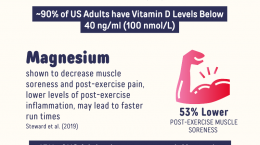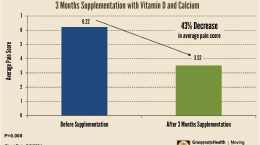Published on August 11, 2024
New study shows vitamin D and magnesium deficiency were both related to an increase in fibromyalgia symptoms, most notably physical function and stiffness
Key Points
- Studies have shown that specific nutrients, including vitamin D, magnesium, vitamin B12, and iron, can have positive effects on chronic pain and other symptoms among fibromyalgia patients
- Approximately 40% of fibromyalgia patients are vitamin D deficient; meanwhile, low vitamin D levels have been associated with chronic pain, depression, and anxiety in fibromyalgia patients
- Magnesium deficiency can cause muscle weakness, paraesthesia (the feeling of tingling or pins and needles), and is related to increased inflammation, all of which are associated with fibromyalgia; low magnesium intake has been associated with a worse pain threshold among fibromyalgia patients
- A new study confirmed that vitamin D and magnesium deficiency were both related to an increase in fibromyalgia symptoms, most notably physical function and stiffness
 Chronic, wide-spread pain, consisting for a minimum of 3 months, is the main symptom experienced by individuals with fibromyalgia. Additional symptoms include fatigue, sleep issues, cognitive impairment, depression, migraines, and others. Fibromyalgia patients also have higher risk of cardiovascular disease and metabolic disorder.
Chronic, wide-spread pain, consisting for a minimum of 3 months, is the main symptom experienced by individuals with fibromyalgia. Additional symptoms include fatigue, sleep issues, cognitive impairment, depression, migraines, and others. Fibromyalgia patients also have higher risk of cardiovascular disease and metabolic disorder.
Nutrients Shown to Improve Fibromyalgia Symptoms
Studies have shown that specific nutrients, including vitamin D, magnesium, vitamin B12, and iron, can have positive effects on chronic pain and other symptoms among fibromyalgia patients, as discussed in a new review by Tarsitano et al..
Vitamin D
Studies have shown that approximately 40% of fibromyalgia patients are vitamin D deficient; meanwhile, low vitamin D levels have been associated with chronic pain, depression, and anxiety in fibromyalgia patients.
“It is known that vitamin D has a role in chronic muscle pain, which is the main factor limiting physical activity. Indeed, vitamin D deficiency is associated with chronic muscle pain, with symptoms improving after supplementation.”
One study reviewed found improvement of fibromyalgia symptoms among 90 individuals with mild vitamin D deficiency after 8 weeks of supplementation with 50,000 IU vitamin D3; other studies have found similar results.
Magnesium
Magnesium deficiency can cause muscle weakness, paraesthesia (the feeling of tingling or pins and needles), and is related to increased inflammation, all of which are associated with fibromyalgia. Additionally, low magnesium intake has been associated with a worse pain threshold among fibromyalgia patients.
“Secondly, we found a significant negative correlation between magnesium and stiffness in fibromyalgia patients, confirming the role of magnesium in muscle function… Magnesium deficiency was largely associated with low-grade inflammation, muscle weakness, and paresthesia, which are typical symptoms of fibromyalgia.”
Vitamin B12 and Iron
Vitamin B12 has also shown beneficial in reducing chronic pain, as B12 can inhibit inflammation and affect neuronal activity. B12 has also been shown to help improve fatigue. In addition, fibromyalgia patients also tend to have a higher incidence of non-anemic iron deficiency compared to individuals without fibromyalgia, as has been demonstrated among studies looking at iron and ferritin levels.
Influence of Vitamin D and Magnesium Demonstrated in New Study
Tarsitano et al. also conducted their own study, which included 20 females with fibromyalgia and 20 without fibromyalgia, chronic disease, or pain as the control group. They measured blood levels of vitamin D, magnesium, B12, iron, and ferritin, and compared these levels to the severity of fibromyalgia symptoms.
The study found that vitamin D levels were negatively correlated with physical function, and magnesium levels were negatively correlated with stiffness. In other words, vitamin D and magnesium deficiency were both related to an increase in fibromyalgia symptoms, most notably physical function and stiffness.
The study authors concluded,
“Screening for micronutrient deficiencies in fibromyalgia patients is useful in clinical practice. Supplementation in patients – even when not deficient – should be considered due to the inverse association between vitamin D and magnesium levels and physical function/stiffness.”
Measure Your Levels of Vitamin D and Magnesium… Your Nutrient Intake is an Easily Modifiable Factor to Help Improve Your Health
 Having and maintaining healthy vitamin D, zinc and other nutrient levels can help improve your health now and for your future. Choose which to measure, such as your vitamin D, omega-3s, and essential minerals including magnesium and zinc, by creating your custom home test kit today. Take steps to improve the status of each of these measurements to benefit your overall health. You can also track your own intakes, symptoms and results to see what works best for YOU.
Having and maintaining healthy vitamin D, zinc and other nutrient levels can help improve your health now and for your future. Choose which to measure, such as your vitamin D, omega-3s, and essential minerals including magnesium and zinc, by creating your custom home test kit today. Take steps to improve the status of each of these measurements to benefit your overall health. You can also track your own intakes, symptoms and results to see what works best for YOU.
Enroll and test your levels today, learn what steps to take to improve your status of vitamin D (see below) and other nutrients and blood markers, and take action! By enrolling in the GrassrootsHealth projects, you are not only contributing valuable information to everyone, you are also gaining knowledge about how you could improve your own health through measuring and tracking your nutrient status, and educating yourself on how to improve it.





